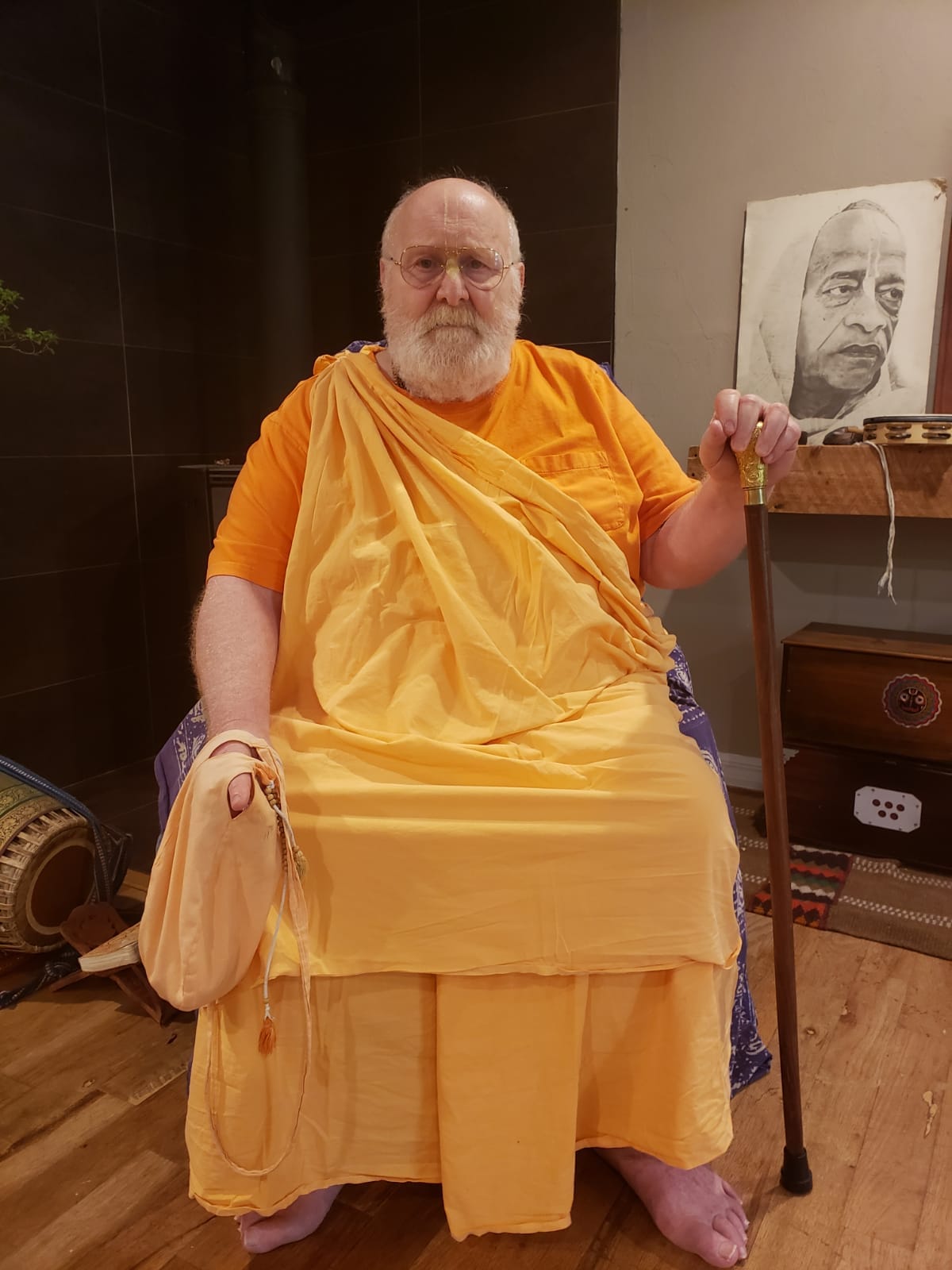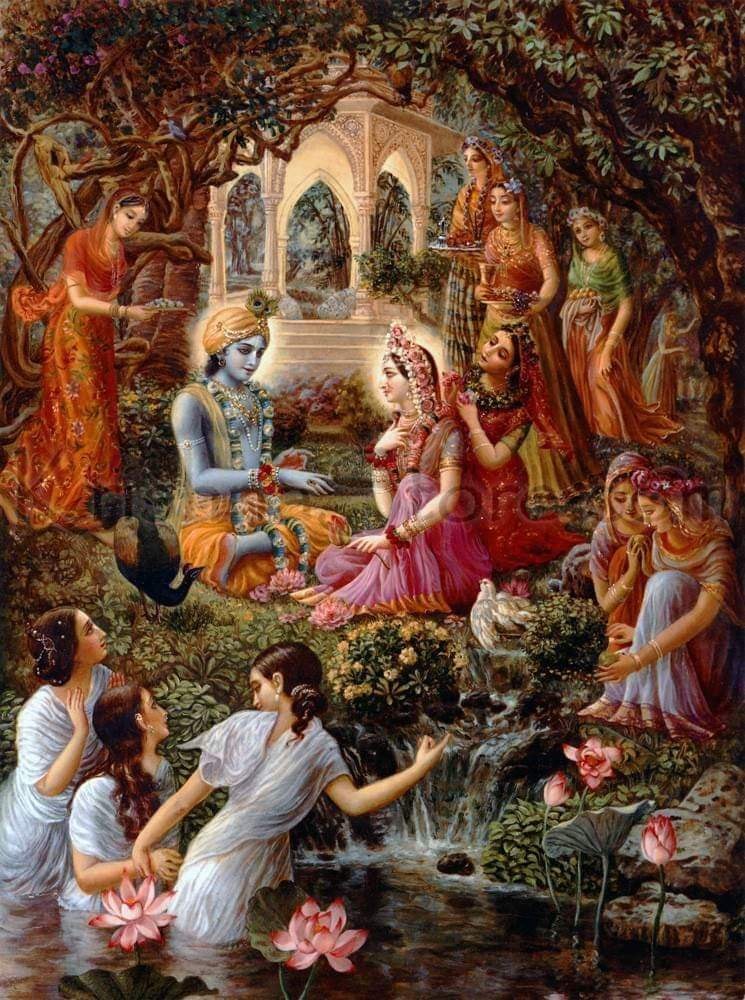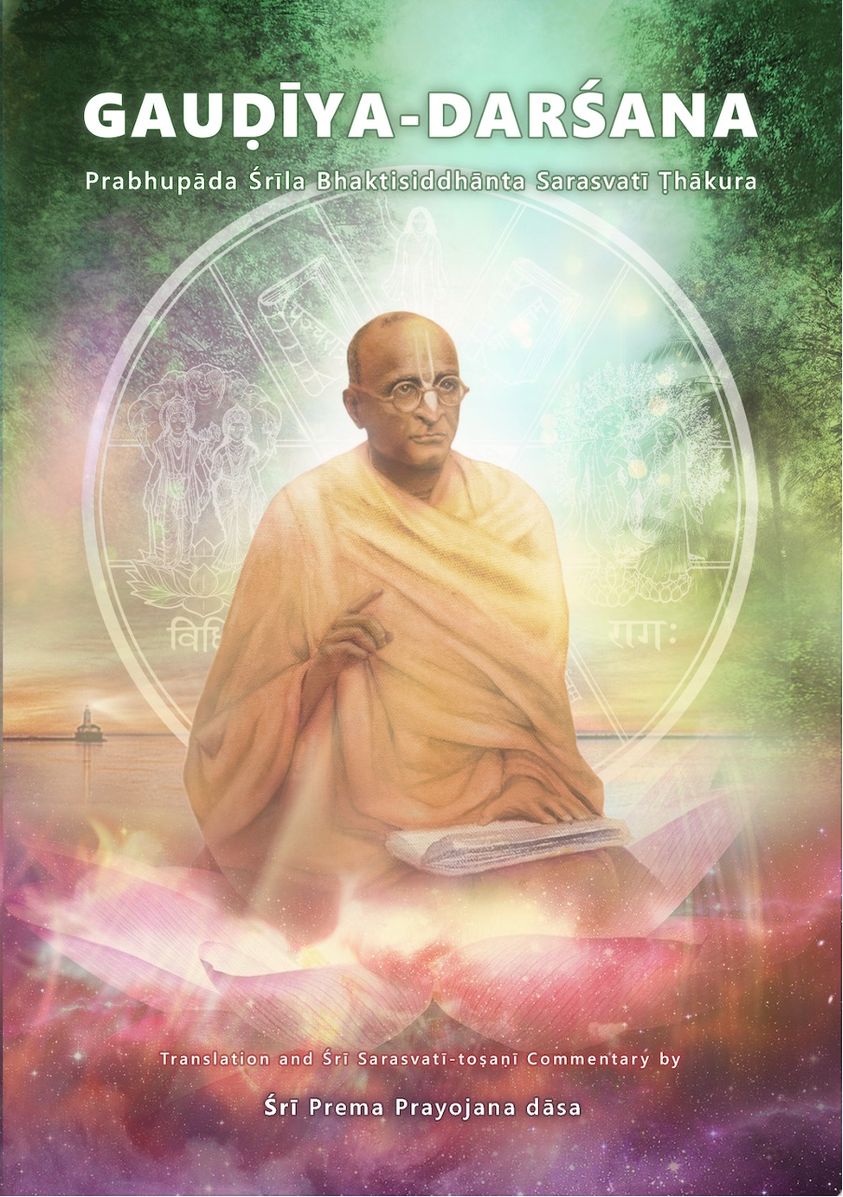
LIVING STILL IN SOUND
By Sripad Bhaktivedanta Bhagavat Maharaja
Written on Srila Haridasa Thakuras Disapperance day in 2015
So I thought I would discuss the Poem that Srila Bhaktivinode Thakura wrote regarding his disappearance. I am in the process of writing my thesis on transcendental sound vibration, its difference from material sound and how it manifests in this world. Oddly enough I was recently focusing on a statement of Srila Bhaktivinode Thakura concerning the continuation of the manifest presence of the transcendental sound vibration within this world. I would like to present to you some of the realizations I have had regarding this….
He reasons ill who tells that Vaishnavas die When thou art living still in sound. The Vaishnavas die to live and living Try to spread the holy life around! This is part of poem written by Srila Bhaktivinode Thakura while contemplating on Srila Hari Das Thakura’s Samadhi. There are a number of devotees who like to quote this verse as evidence that the tape recordings of the pure devotee are the continuation of and manifest presence of the transcendental sound vibration of the pure devotee. Srila Bhaktivinode Thakura wrote this poem in 1871. Therefore this verse was written six years before the Gramophone was invented by Thomas Alva Edison. Furthermore it was written about someone who most certainly was manifest and left this world in an era when no such recording device existed. If we consider this carefully an intelligent person would inquire what the intention of the author was when he said that the person is living still in sound. What sound? From where will the sound of the personality Srila Hari Das Thakura come from since there are no tape recordings of him speaking? How will we hear this sound? If there were no mechanical devices to record and replay the sound of Srila Haridas Thakura's voice then the sound Srila Bhaktivinode Thakura is referring to must be the transcendental sound vibration emanating from his lotus lips. However if Srila Haridas Thakura is not manifest in this present space time continuum, and there are no recordings then from where will the transcendental sound from Srila Haridas Thakura's lotus lips come from?
The answer is quite simple, from the present manifest Acharya and other pure sadhus. Srila Bhaktivinode Thakura is obviously talking about the Living Sound Vibration coming from the present manifest Sadhu. The sound that emanates from Sri Krishna’s flute and enters the ear holes of Lord Brahma and then enters into his heart descends through the Parampara to the present manifest sadhu. Hence there is only one transcendental sound vibration and the carriers of that sound vibration may appear to be different by appearance and personality but in fact they are one and the same messenger with the same message with the same transcendental sound vibration emanating from their lotus lips. Srila Prabhupada addresses this issue in a lecture he delivers from the Srimad Bhagavatam sixth canto, first chapter, twenty fourth verse in Chicago on July 8th 1975: “Then how I shall make progress?"
Now, namanta eva san-mukharitam bhavadiya-vartam. "Just hear the message of God." "From whom?" San-mukharitam: "through the mouth of the devotees." Not professional, not gramophone—through the mouth of, through the lips of real devotee.” You will notice that Srila Prabhupada points out that this transcendental sound cannot be received from a professional reciter or from a gramophone recording. Both are material and both cannot hold the living transcendental sound vibration.
Srila Prabhupada further supports this in a room conversation that he has on August 9th 1971: “Guest: If you could just explain to me the difference between the… I mean, how this fits in, the monistic or the idea of the unitary view that Krsna is everything, all and in all. And then at the same time that the world, there is this world of illusion which is somehow distinct from Krsna. Could you just explain this point to me? Prabhupäda: This is very easy to understand. Just like you are recording my speeches in the tape recorder. When you play back it will speak just like I am speaking, but I am not there. Is it not fact? Guest: Yes. Prabhupäda: It will appear now I am speaking from beyond this world.” Srila Prabhupadas choice of words is telling and very specific.
The meaning is clear: It appears I am speaking from beyond this world. It appears when we hear the tape recording that he is there but as Srila Prabhupada says I am not there. In another lecture in Bombay on March 30 1971 Srila Prabhupada further clarifies the same point he is making in the room conversation to this man: “But Krsna says that itiyam me bhinnä prakrtir astadha, "These eight kinds of material elements, they are separated energy from Me." Separated energy, you can understand very easily. Just like I am speaking and it is being recorded in the tape recorder. When the tape recorder is replayed again, you'll find that I am speaking again. But that speaking and my present speaking is different. Therefore that speaking is separated energy. Now I am speaking directly. That is not separated, but when it is transferred to another matter that is separated energy.” It is different He is not speaking directly. It is separated energy, separated from him, not him, it only appears to be him but he is not there.
Then again Srila Prabhupada states the importance of transcendental sound coming from the Living Bhagavat, a terminology that some devotees often describe as an oxymoron and incorrect statement of siddhanta. However, we will see here that Srila Prabhupada himself uses the terminology. The two bhagavatas. You study Srimad-Bhagavatam from living bhagavata. So if one does not take or does not surrender unto the living bhagavata, he cannot understand Srimad-Bhagavatam. 720420SB.TOK lectures Bhagavatam has to be studied from the very beginning and take the lessons from live bhagavata. 750908SB.VRN lecture Some devotees say that the tape recorder and books which are engaged in the service of the Supreme Lord are themselves transcendental so they must carry sabda brahaman. However is it only sabda brahman that is being transmitted by Srila Prabhuada in the tapes or is it something else.
Lets explore that concept now. In Srimad Bhagavatam Canto 1 Chapter 2 Verse 11 it is stated: vadanti tat tattva-vidas tattvaṁ yaj jñānam advayam brahmeti paramātmeti bhagavān iti śabdyate. Learned transcendentalists who know the Absolute Truth call this nondual substance Brahman, Paramātmā or Bhagavān. So when Srila Prabhupada talks about the microphone being spiritual what context is he talking about it in? Is he talking about it as Brahman, Paramatma, or Bhagavan? Is the microphone Bhagavan Sri Krishna from Goloka Vrindavan? Is the microphone the all pervasive Paramatma? Or is he saying it is spiritualized Brahman? Lets look at the purport to the 24th verse of the 4th chapter of Bhagavad Gita. "The Lord is spiritual, and the rays of His transcendental body are called brahmajyoti, His spiritual effulgence. Everything that exists is situated in that brahmajyoti, but when the jyoti is covered by illusion (māyā) or sense gratification, it is called material. This material veil can be removed at once by Kṛṣṇa consciousness; thus the offering for the sake of Kṛṣṇa consciousness, the consuming agent of such an offering or contribution; the process of consumption, the contributor, and the result are—all combined together—Brahman, or the Absolute Truth.
The Absolute Truth covered by māyā is called matter. Matter dovetailed for the cause of the Absolute Truth regains its spiritual quality. Kṛṣṇa consciousness is the process of converting the illusory consciousness into Brahman, or the Supreme." So here Srila Prabhupada is explaining that the microphone is being transformed into Brahman. But that is the most incomplete aspect of the supreme lord. Brahman does not contain the moods of the inhabitants of vraja it does not contain the mood of Srimati Radhika for Krishna that is contained in Bhagavan realization.
In Caitanya Caritamrta Madhya Lila 8th Chapter verse 65 Ramanada Raya suggests the following verse to be the ultimate goal of life:
brahma-bhūtaḥ prasannātmā na śocati na kāṅkṣati samaḥ sarveṣu bhūteṣu mad-bhaktiṁ labhate parām
Rāmānanda Rāya continued, "According to the Bhagavad-gītā, 'One who is thus transcendentally situated at once realizes the Supreme Brahman and becomes fully joyful. He never laments or desires to have anything. He is equally disposed toward every living entity. In that state he attains pure devotional service unto Me.' "Sri Caitanya Mahaprabhu responds in the 66th verse as follows:
prabhu kahe,–"eho bāhya, āge kaha āra" rāya kahe,–"jñāna-śūnyā bhakti–sādhya-sāra"
After hearing this, the Lord, as usual, rejected it, considering it to be external devotional service. He again asked Rāmānanda Rāya to speak further, and Rāmānanda Rāya replied, "Pure devotional service without any touch of speculative knowledge is the essence of perfection." So the Brahman platform is rejected by Sri Caitanya Mahaprabhu as being external devotional service. That means it is devoid of Prema, the moods of the inhabitants of Vraja. It is devoid of the moods of Srimati Radhika for Krishna. Later in this conversation when Sri Ramanada Raya describes Prema as the ultimate goal then Sri Caitanya Mahaprabhu becomes satisfied and asks Ramananda Raya to explain further about Prema. Now what is the transcendental sound emanating from the lips of the pure devotee the living Bhagavat. How is this prema different from Brahman.
For this we need to look at the 4th canto 20th chapter verse 25:
sa uttamaśloka mahan-mukha-cyuto bhavat-padāmbhoja-sudhā kaṇānilaḥ smṛtiṁ punar vismṛta-tattva-vartmanāṁ kuyogināṁ no vitaraty alaṁ varaiḥ
"My dear Lord, You are glorified by the selected verses uttered by great personalities. Such glorification of Your lotus feet is just like saffron particles. When the transcendental vibration from the mouths of great devotees carries the aroma of the saffron dust of Your lotus feet, the forgetful living entity gradually remembers his eternal relationship with You. Devotees thus gradually come to the right conclusion about the value of life. My dear Lord, I therefore do not need any other benediction but the opportunity to hear from the mouth of Your pure devotee."
In the purport Srila Prabhupada gives us further insight. "A pure devotee always engages in the service of the Lord, taking shelter of His lotus feet, and therefore he has a direct connection with the saffron mercy-particles that are strewn over the lotus feet of the Lord. Although when a pure devotee speaks the articulation of his voice may resemble the sound of this material sky, the voice is spiritually very powerful because it touches the particles of saffron dust on the lotus feet of the Lord. As soon as a sleeping living entity hears the powerful voice emanating from the mouth of a pure devotee, he immediately remembers his eternal relationship with the Lord, although up until that moment he had forgotten everything." In the word for word Srila Prabhupada translate two words as follows: sudhā—of nectar; kaṇa—particles; Yet in the verse and the purport he calls them Saffron Particles. What is the meaning of Saffron Particles as opposed to Nectar Particles? Why does Srila Prabhupada call them saffron particles?
Lets look at a verse from a poem written by Srila Rupa Goswami called Radhikastakam. amala-kanaka-pattodghrsta-kasmira-gaurim I worship that Srimati Radhika, whose fair complexion resembles saffron which has been ground upon a slab of pure gold; So you will note that the word Kasmira means Saffron and the word sudha means nectar. Yet Srila Prabhupada chose to use the word Saffron in the verse and purport to describe the particles of dust on the feet of the lord. Not nectar dust but saffron dust. Where does this saffron dust come from? How does it get on the lotus feet of the Lord. For this we have to look at the Venu Gita of Srimad Bhagavatam canto 10, chapter 21verse 17:
pürnah pulindya urugäya-padäbja-raga- sri-kunkumena dayita-stana-manditena tad-darsana-smara-rujas trna-rusitena limpantya anana-kucesu jahus tadadhim “
O sakhi! These Pulindis, the young maidens who live in the forest, are fully satisfied because they possess anuraga, extraordinary attachment, for Sri Syamasundara within their hearts. When they see Him, the pain of divine lust arises within them and their hearts are struck with the disease of love. And when they see the grass covered with kunkuma, these forest maidens are immediately overwhelmed by the burning torment of smara. This reddish kunkuma, coming from Syamasundara’s lotus feet when He roams about Vrndavana, adorned the breast of one of His beloveds. The supremely fortunate Pulinda girls take this kunkuma and smear it on their faces and breasts, and in this way alleviate the anguish of their desire.”
This Kunkuma on the lotus feet of the Lord is coming from the breasts of Srimati Radhika and contains saffron both in its content and its association with the saffron colored complexion of Srimati Radhika. So when Srila Prabhupada translates the word Sudha which means nectar into the word Saffron then he is indicating that the saffron dust coming from the Lords lotus feet is carrying the prema of Srimati Radhika. So when he says in the purport: "Although when a pure devotee speaks the articulation of his voice may resemble the sound of this material sky, the voice is spiritually very powerful because it touches the particles of saffron dust on the lotus feet of the Lord." He is talking about this saffron dust which is smeared upon the Lords lotus feet from the lotus breasts and lotus feet of Srimati Radhika when he engages in love play with her. The microphone and tape recorder is certainly Brahman when it is engaged in the service of the Supreme Lord Syamsundara as Srila Prabhupada indicates in the purport to the 24th verse of the 4 chapter of Bhagavad Gita.
However we can understand from Raya Ramananda Samvada that this platform of devotional service is considered external by Sri Caitanya Mahaprabhu. It does not carry the internal moods of prema from Srimati Radhika. So what Srila Prabhupada is speaking about in the purport is something much more spiritually refined then the Brahman that the tape recorder is made out of as we see in SB 1.2.11 The tape recorder is only Brahman not Bhagavan it is external devotional service not internal prema. This Prema the saffron particles are not carried in the tape recording as Srila Prabhupada says "it appears that I am speaking but I am not there." It appears like that but it is not so. Why because there is no mechanism on the tape recorder to collect the saffron particles from the lotus feet of the Lord and distribute them as the tape recorder is only Brahman and external devotional service and the saffron particles are Prema.
Please show me the mechanism that carries Prema in the tape recorder and distributes it and I will gladly concede your point that sound coming from the tape recorder is the transcendental voice of Srila Prabhupada. However, using Srila Prabhupada's quotes I have established that the tape recorder is only Brahman when engaged in the service of the Lord which is external devotional service not internal Prema. Therefore even in its spiritualized form it is incapable of holding the prema in the form of the saffron particles that is carried on the transcendental voice of the pure devotee.
This is only experienced in the direct association of the pure devotee when he speaks. Hence Srila Saraswati Thakura states: "Krishna’s darshana can only be attained through the medium of the ear as one hears hari-kathä from pure Vaishnavas; there is no other way." Sri Srimad Bhaktisiddhanta Saraswati Thakura Srila Prabhupada "Upadeshavali" number 18 The transcendental sound vibration coming from Srila Prabhupada's voice is Sabda Prema. This is what is in the transcendental voice of the LIVING BHAGAVAT. Any devotee who is hearing the transcendental voice of the living Bhagavat in the present space time continuum is hearing the transcendental voice of Srila Haridasa Thakura which contains that sabda prema. Because, it is in that Living transcendental voice, that Srila Haridasa Thakura is Living still in sound. This is the exact meaning of Srila Bhaktivinodes poem.
Your Servant Bhagavat Swami
You sent
Bhagavat

You sent
Bhagavat

You sent

 Posted in
Posted in 









